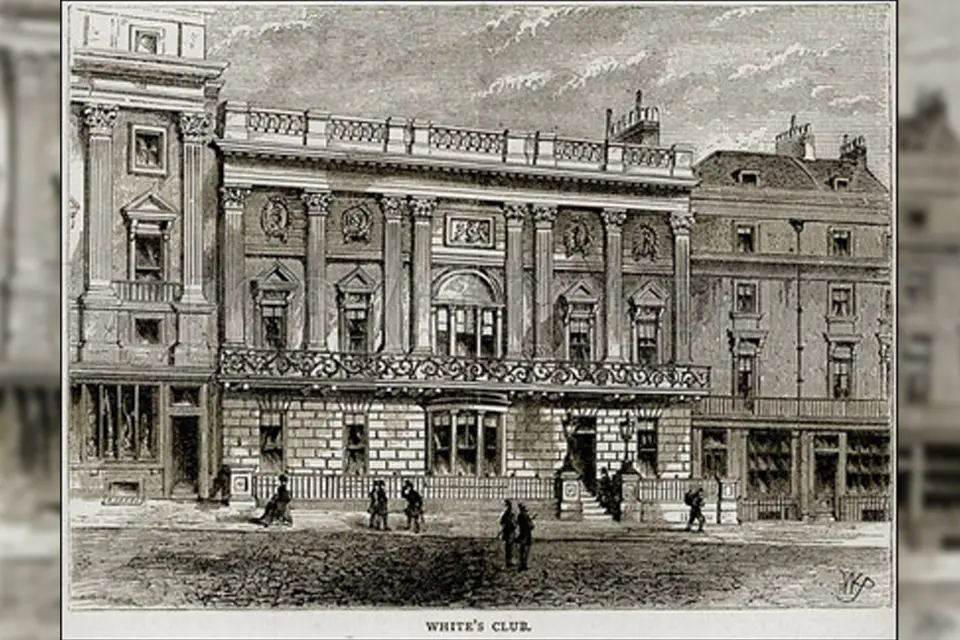Private men’s clubs: a place where billionaires meet
August 21, 2025

Have you ever wondered where the most influential people in the world actually meet? Somewhere where they won't be caught by the public or journalists, a place where there are no cameras and they can breathe easy and relax. We don't know if you've heard of exclusive men's clubs where influential people can discuss their power, fears, ambitions, conflicts, and strategies. These are not just interest clubs or expensive lounges, as you can't just walk into these elite gentlemen’s clubs; it doesn't matter how much money you pay, what your status is, or how influential you are, because you can only become a member by invitation and recommendation.
In this article, we will discuss why these private men’s clubs are needed, why men dream of joining them, and who creates them. You will also find a small selection of the most popular men's clubs. Of course, we won't reveal all their secrets, but you will be able to take a peek at what goes on there. Make yourself a cup of coffee or tea, the article will be interesting, so let's get started.
History of exclusive men-only societies
To understand what private men's clubs are today, we need to go back to their origins — to where it all began. The idea of a men's club as a closed, elite space where men from a certain circle gather has its roots in the distant past, existed long before terms such as “networking” and “social capital” appeared. The first prototypes of such communities can be found in ancient times: in Ancient Greece, these were symposiums — men's feasts where politics, philosophy, art, and military affairs were discussed. Of course, all the nobility attended; there were no poor people there. For example, in England in the 18th and 19th centuries, clubs formed in London that became places for relaxation, where men could socialize among themselves, without women, servants, or outsiders. These private men’s clubs became an integral part of the lives of the aristocracy, senior officers, judges, politicians, and representatives of ancient families. For example, White's Club (founded in 1693) remains one of the most exclusive and influential elite gentlemen’s clubs in the world; as its members included Winston Churchill, Prince Charles, and many other people who made decisions at the state level. It is no coincidence that many clubs of that time had strict rules: by recommendation only, for men only, no open talk about money, no displays of emotion.
Over time, clubs began to divide according to interests: elite gentlemen’s clubs for the military (United Service Club), for diplomats, for writers, and even for wine collectors appeared. The same structure is still in place today, nothing has really changed; club members are wealthy men with good connections. Most of them are popular Hollywood stars looking for privacy from cameras and fans, but there are also millionaires who want to relax with people who share their interests.
What goes on in elite men’s clubs ?
When it comes to private men's clubs, many people imagine something mysterious, inaccessible, and shrouded in secrecy. Indeed, it is precisely their exclusivity and inaccessibility that make such establishments so desirable.
But what exactly makes them so exclusive? Let's break it down point by point, in a simple and accessible way.
Who can join such a club?
The first thing that creates an aura of exclusivity is a very strict and selective approach to accepting new members, so you don't get into these luxury men’s clubs just because you have money or connections. It is important to be a person with an impeccable reputation, high social status, and, preferably, recommendations from those who are already members of the club. Membership may even require a vote or approval by a special committee. Essentially, the harder it is to get in, the more you want to be part of this exclusive community.
Who are the typical members of these clubs?
As a rule, they are successful men: well-known businessmen, politicians, sports stars, cultural figures, or show business personalities, and sometimes members of influential families where membership is passed down from generation to generation. The point is not only to bring influential people together in one place, but also to give them the opportunity to interact with each other in a relaxed and trusting atmosphere. Such a social circle becomes an important element for building relationships, exchanging experiences, and resolving issues that are not openly discussed in ordinary places.
Atmosphere and interior comfort
As for the club itself, it is usually designed to be as comfortable and even luxurious as possible. The interior of such clubs is often custom-designed by renowned designers, the furniture and decor are individually selected with taste, while the rooms exude an atmosphere of privacy and sophistication. It is not just a beautiful place to meet, but a real refuge from the outside world, where club members can relax and socialize without prying eyes and ears.
The service in such clubs is also special: the staff remembers your habits, favorite dishes, drinks, and even how you like to be served. Here you can find wine cellars, cigar rooms, private libraries, spa areas, and rooms for private events, closed from any prying eyes.
Complete confidentiality
One of the most important rules of such elite gentlemen’s clubs is confidentiality: everything that is said inside the club stays inside the club. This is what allows members to have frank conversations on any topic, discuss business and personal matters without fear of information leaks or scandals. Violating this rule can result in not only losing membership, but also respect within the circle — and that is much more valuable than any membership fees.
Community traditions and rules
Special traditions, some of which have been formed over decades or even centuries, become an important part of club life. These may include annual gala dinners, special initiation rituals for new members, lectures by famous guests, or closed meetings on specific topics. It is these traditions that help club members feel part of something special and important, creating a sense of unity and pride in belonging to an exclusive community.
The financial side of things
Membership in such private men’s clubs is usually expensive, and this is no accident. The high financial threshold serves as an additional filter to ensure that club members are roughly on the same level of wealth and social opportunity. It also helps to ensure first-class service and maintain a high level of services and infrastructure.
What does a member of such a club get?
By becoming a member of an exclusive men's club, a person gets much more than just status. They find themselves in a closed community where they can not only spend time, but also effectively build a career, make useful acquaintances, communicate with interesting people, and develop personally and professionally.
Ultimately, such exclusive men-only clubs become an important part of the lives of influential people, allowing them to be themselves and feel comfortable among their peers.
Top secret clubs for men
White's (London, United Kingdom)
White's is the oldest and one of the most elite gentlemen’s clubs in the United Kingdom, founded in 1693. Its residence is located in the heart of London's St. James's, and in its nearly 330 years of existence, so it has become a symbol of traditional British elitism.
It is impossible to gain entry without a personal invitation and the support of at least two current members of the club. Membership cannot be bought — it can only be earned.
Club members include Prince William, former Prime Minister David Cameron, Jacob Rees-Mogg, the Rothschild bankers, former MI6 chief Sir John Scarlett, and members of the Churchill and Cavendish families.
What happens at the club:
- Private dinners and discussions of government policy in an informal setting;
- Private meetings of the financial and political elite;
- Traditional evenings by the fireplace with cigars and rare whiskey;
- Card games and reading in the library with its collection of rare books;
- Annual banquets and private social events.
The club has strict rules: no women, no cell phones, and absolute confidentiality. The interiors have not changed since the 19th century, and this is part of the aesthetic.
Bohemian Club (San Francisco, USA)
The Bohemian Club is one of the most mysterious and influential private men’s clubs in the world.
Founded in 1872, it is based in San Francisco, but its main territory is the private Bohemian Grove forest in Northern California, where the entire intellectual and political elite of the United States gathers every year.
Among the club's members are US presidents (including Ronald Reagan, George H. W. Bush, and Richard Nixon), CIA directors such as William Colby, billionaires David Rockefeller and Henry Kissinger, media moguls such as William Randolph Hearst, and actors such as Clint Eastwood and Danny Glover.
What happens at the club:
- An annual two-week camp in the woods with a mystical ritual called “Cremation of Care”;
- Private theater performances with high-ranking guests;
- Strategic informal negotiations, which, according to rumors, influenced the launch of the Manhattan Project;
- Strict adherence to the principle of “no work in camp,” although political discussions still take place.
The club is strictly for men, women are not allowed. The entrance fee is about $25,000 and the annual fee is $5,000; still, the main difficulty is not the money, but the need for a personal invitation and a long wait.
California Club (Los Angeles, USA)
The California Club is a private club for California's business elite, founded in 1888. Located in downtown Los Angeles, behind the facade of a classic Italian Renaissance-style building lies a space where key decisions for the entire region are made.
Club members include managing partners of law firms, California Supreme Court judges, state governors, media moguls such as Rupert Murdoch, billionaire Elon Musk (who, according to several sources, has attended closed meetings), and high-ranking officials from the Los Angeles City Hall.
What happens at the club:
- Business lunches and receptions accompanied by discussions on investments and judicial reforms;
- Arbitration and informal legal consultations;
- Evening dinners, interest-based meetings, speaker sessions, and private lectures;
- Access to rare vintage wines and cigars.
The club's interiors are reminiscent of old American success: wood, marble, 19th-century paintings, and a formal dress code. The initial membership fee is approximately $30,000, with an annual fee of $4,000, and candidates undergo a background check and an interview with the admissions committee.
Travellers Club (London, United Kingdom)
The Travellers Club is a club for diplomats, scholars, and people who study and change the world. Founded in 1819, it is located on Pall Mall, alongside some of London's oldest secret men’s societies.
Club members include MI6 intelligence officers, British ambassadors, international lawyers, archaeologists, former Foreign Office advisers, British Academy laureates, and members of the Royal Geographical Society. Its members have included historical figures such as Charles Darwin, Thomas Babbage, and Richard Burton (explorer).
What happens at the club:
- Private evenings to discuss international crises;
- Lectures on travel, expeditions, and scientific discoveries;
- Book clubs, themed dinners, and diplomatic receptions;
- Secret briefings available only to club members.
This is a club for intellectuals with a global mindset, where women are only allowed as guests. There is no open Wi-Fi, the entrance fee and annual membership fee are not disclosed, and the dress code is strict and behavior is formal. To be admitted, you need a recommendation from at least two members, one of whom must have been a member of the club for at least 15 years.
The Garrick Club (London, United Kingdom)
The Garrick Club is a club for men of art and literature, founded in 1831. It is located in the heart of London's theater district and has always been closely associated with the world of the performing arts.
Club members include: Hugh Laurie, Stephen Fry, Benedict Cumberbatch, Sir Ian McKellen, as well as dozens of famous actors, theater critics, writers, and directors of the British Council for Culture.
What happens at the club:
- Intellectual lunches with discussions of theater premieres;
- Presentations of new books and literary debates;
- Cozy evenings with playwrights and artists from the Royal Stage;
- Discussions of cultural policy within the framework of British soft power.
The interiors are filled with portraits of playwrights and actors, many of which were painted during their lifetimes. The club remains male-only, and only in recent years has there been discussion about including women. Aditionally, admission is by recommendation and approval of the club's current board.
The Metropolitan Club (New York, USA)
One of Manhattan's most prestigious private men’s clubs, founded in 1891 by J. P. Morgan. It is a space where the aristocracy of the Old World meets the new magnates of the 21st century.
Club members include New York's financial elite, descendants of the Vanderbilts and Kennedys, major Wall Street investors, prominent lawyers, conservative senators, and influential architects.
What happens at the club:
- Formal gala dinners and private meetings of fund managers;
- Legal round tables and meetings on government tenders;
- Closed chess tournaments, dinners with historical lectures;
- Secret discussions of lobbying strategies.
The interior is decorated in the spirit of Renaissance Italy, black ties are mandatory, and there are no cameras or Wi-Fi. Women are only allowed as companions, while membership is by invitation only, and the entrance fee is not disclosed.
Jockey Club (Paris, France)
Founded in 1834, the Jockey Club became a symbol of the Parisian elite in the 19th century and remains a private club for the most influential men in France.
Club members include: right-wing politicians, representatives of the Boulanger, Pino, and Arnault families, rectors of the Sorbonne, France's oldest notaries, and high-ranking members of the Academy of Sciences.
What happens at the club:
- Intellectual salons dedicated to art, philosophy, and French literature;
- Private discussions between politicians and economists;
- Closed music evenings and wine tastings with rare Bordeaux wines;
- Curating cultural initiatives for UNESCO and the Louvre.
The atmosphere is strict but refined. Talking about finances is not allowed in the club; discussing money is considered bad form. Women are not allowed to enter and membership is hereditary or by internal vote.
Gentlemen’s club rules and rituals
- Dress code: A suit, jacket, and tie are almost always required. In some luxury men’s clubs, such as White's or the Metropolitan Club, appearing without a jacket is considered a personal insult to tradition. Bohemian Grove allows a more relaxed style, but only during the daytime. White gloves, patent leather shoes, and a ban on jeans and T-shirts are standard.
- Food: Breakfast is served strictly before a certain time (usually before 10:30 a.m.), and lunch is served from a pre-set menu. At White's, it is customary to order lamb with mint jelly, at Garrick's, meat pie made according to an old recipe, and at the Metropolitan, French delicacies. Wine is selected from the club's own cellar collection, often with bottles aged 30–50 years. Alcohol is not allowed everywhere: in some rooms, only whiskey or port is allowed, while in others, alcohol is completely prohibited.
- Behavior: The main rule is discretion: never discuss who you saw at the club, not in the press, not on the street, and certainly not on social media. Cell phones are prohibited or must be handed in at the entrance. Interrupting someone is considered bad form, and arguing in a raised voice is grounds for expulsion.
- In secret men’s societies, people do not talk about money directly, brag about deals, take photos, or make notes. What matters here is default status, not showing off. In this sense, arriving tipsy is unacceptable, and being rude to staff is tantamount to voluntary expulsion.
- Humor is a special topic. Irony, self-irony, and classic English sarcasm are highly valued in exclusive men-only clubs. However, below-the-belt jokes or vulgar comparisons are considered unacceptable.
If you follow all the rules, the club will eventually begin to trust you. And trust is the key to everything that is truly valuable behind its doors.
Careers born behind closed doors
If you think that the fate of world leaders is decided at summits, you are only partly right. The most influential decisions are often made in the shadows, between sips of whiskey and cigar smoke; therefore, private men’s clubs have always been more than just a place to relax. They are social incubators of power, where careers are not just launched — they are polished, cemented, and set in motion like Swiss watches.
Ronald Reagan did not become president of the United States right away. But it was at Bohemian Grove, surrounded by future defense ministers and oil magnates, that he received the tacit support of California's old Republican elite. And it was there, under the redwoods, that his name was first mentioned as a possible alternative to Gerald Ford.
Henry Kissinger, known as a man capable of stopping a war with a single phone call, attended the same meetings for decades. At the Bohemian Club, he tested ideas with those who commanded aircraft carriers and megacorporations. When Kissinger spoke, people listened, because he spoke with “them” when there were no microphones yet.
David Cameron, while still a modest assistant in the shadows of the party, was already going to White's. There, he didn't so much socialize as “grow into” the structure of the British aristocracy — through whiskey, irony, and acquaintances with those who would donate to his campaign without asking questions. His path to becoming prime minister was not straightforward — but it began right there, behind the oak doors of the club, where money is not discussed, but where people know who has it.
Stephen Fry and Hugh Laurie are not just actors, they are part of Britain's cultural code. Their long-standing creative partnership, shows, books, and BBC projects all originated in one way or another at the Garrick Club, among old actors, directors, and playwrights, where a good idea could be approved between oysters and port.
Benedict Cumberbatch, before becoming the world-famous Sherlock, was a regular at the same venues. His career on the stage of the Royal Theater was strengthened not by agents, but by conversations with directors and curators at the Garrick — in the seats once occupied by Bernard Shaw and Conan Doyle.
John Kerry, the future US Secretary of State, was spotted at Bohemian Grove even before he became a senator. The old California aristocracy saw him as “one of them” — and that was enough to set the wheels in motion.
Where are the most influential Billionaire men’s clubs around the world? A comparison by country
United Kingdom
England is the birthplace of classic men's clubs. Here, it's not the amount in your bank account that matters, but your surname, education, and behavior; as clubs like White's or Travellers are not joined by application, but by pedigree and recommendation. Talking about money out loud is a no-no, but it is here, over dinner, that the country's foreign policy may be decided.
- What matters: upbringing, manners, connections.
- Influence: elite, political, traditional.
USA
In America, it's simpler: if you're influential and useful, you're welcome. Private men’s clubs like Bohemian Grove or the California Club are places where presidents find sponsors and billionaires look for partners.
- What matters: status, influence, opportunities.
- Influence: political, business, fast-moving.
France
French luxury men’s clubs are about style, culture, and subtle conversation. At the Jockey Club, they discuss philosophy, not budgets. What matters is how you speak, who you read, and what wine you prefer.
- What matters: taste, intellect, belonging to a cultural milieu.
- Influence: cultural, symbolic.
Japan
Japanese exclusive men-only clubs are almost invisible, so they can be tea houses or rooms on the upper floors of offices. Everything is based on trust, hierarchy, and ritual. People do not raise their voices, speak directly, or rush.
But the decisions made over a table with sake are the most important.
- What is important: respect, restraint, loyalty to the system.
- Influence: hidden, stable, internal.
Middle East
In the Persian Gulf countries, a club is almost always part of a family. It is a place where sheikhs decide where billions will go. There are no formal applications; everything is based on trust, blood, and family influence.
- What matters: family name, connections, respect for tradition.
- Influence: financial, strategic, governmental.
Conclusions
In this article, we explored what private men's clubs are and why they remain so appealing. We looked at where they came from, how they are organized, who goes there, what happens there, what rules exist, and why they are needed at all.
We saw that these are not just elite lounges, but closed communities where influential men — politicians, billionaires, actors, aristocrats — can socialize without cameras, prying eyes, and extraneous noise. It is in places like these that alliances are formed and the fates of businesses and even entire countries are decided.
Secret men’s societies vary from country to country, but they have one thing in common: they create an environment where people can not only relax, but also strengthen their positions, find allies, and sometimes even change the course of their own lives. And while they may seem old-fashioned, they continue to play an important role in the modern system of power and influence.
FAQ`s
Who can recommend a candidate for such a club?
As a rule, only current club members, and not just acquaintances, but respected members with long-standing experience. Some exclusive men-only clubs require at least two recommendations and a personal guarantee for the candidate.
Why are such luxury men’s clubs necessary in the 21st century?
For many influential people, it is a place where they can be themselves, communicate with their peers, have confidential conversations, build informal alliances, and relax in a private setting. It works as an offline alternative to public life.
Is it possible to lose membership?
Yes. For violating club ethics, disclosing internal information, inappropriate behavior, public scandal, or even political activity that does not correspond to the spirit of the community.
Are there any women's or mixed clubs of a similar level?
Yes, especially in the US and Europe. For example, AllBright in London or Soho House are geared toward women leaders.

Posts:
Photos/Videos:
/

Posts:
Photos/Videos:
/

Posts:
Photos/Videos:
/

Posts:
Photos/Videos:
/








1.webp)
3.webp)
2.webp)
1.webp)
2.webp)
1.webp)
2.webp)
1.webp)
1.webp)
3.webp)
1.webp)
2.webp)










